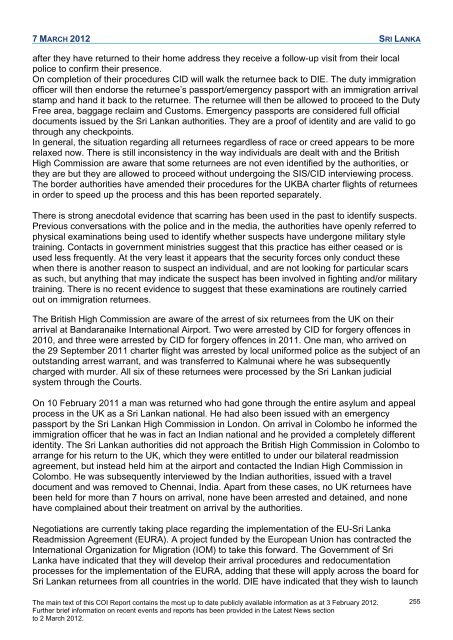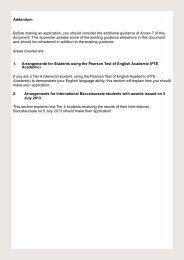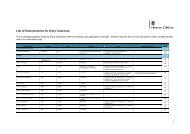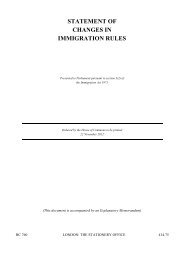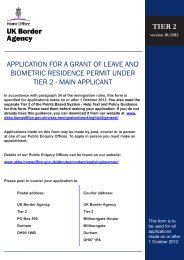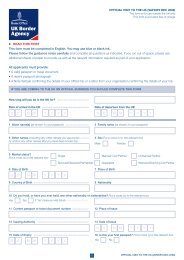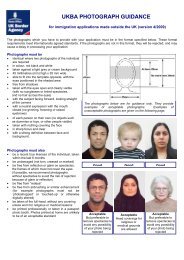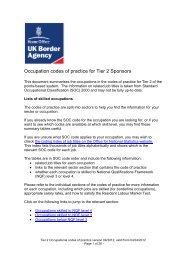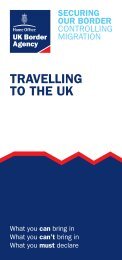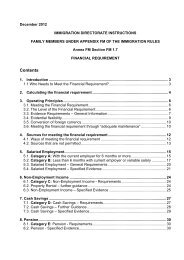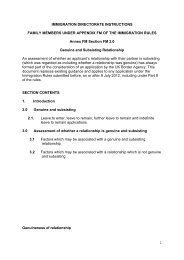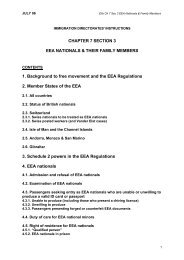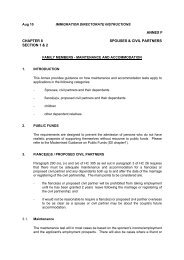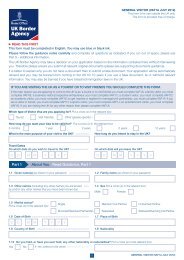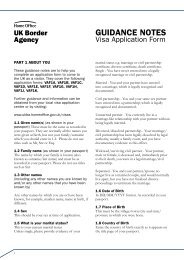COI Report March 2012 - UK Border Agency - Home Office
COI Report March 2012 - UK Border Agency - Home Office
COI Report March 2012 - UK Border Agency - Home Office
Create successful ePaper yourself
Turn your PDF publications into a flip-book with our unique Google optimized e-Paper software.
7 MARCH <strong>2012</strong> SRI LANKA<br />
after they have returned to their home address they receive a follow-up visit from their local<br />
police to confirm their presence.<br />
On completion of their procedures CID will walk the returnee back to DIE. The duty immigration<br />
officer will then endorse the returnee‘s passport/emergency passport with an immigration arrival<br />
stamp and hand it back to the returnee. The returnee will then be allowed to proceed to the Duty<br />
Free area, baggage reclaim and Customs. Emergency passports are considered full official<br />
documents issued by the Sri Lankan authorities. They are a proof of identity and are valid to go<br />
through any checkpoints.<br />
In general, the situation regarding all returnees regardless of race or creed appears to be more<br />
relaxed now. There is still inconsistency in the way individuals are dealt with and the British<br />
High Commission are aware that some returnees are not even identified by the authorities, or<br />
they are but they are allowed to proceed without undergoing the SIS/CID interviewing process.<br />
The border authorities have amended their procedures for the <strong>UK</strong>BA charter flights of returnees<br />
in order to speed up the process and this has been reported separately.<br />
There is strong anecdotal evidence that scarring has been used in the past to identify suspects.<br />
Previous conversations with the police and in the media, the authorities have openly referred to<br />
physical examinations being used to identify whether suspects have undergone military style<br />
training. Contacts in government ministries suggest that this practice has either ceased or is<br />
used less frequently. At the very least it appears that the security forces only conduct these<br />
when there is another reason to suspect an individual, and are not looking for particular scars<br />
as such, but anything that may indicate the suspect has been involved in fighting and/or military<br />
training. There is no recent evidence to suggest that these examinations are routinely carried<br />
out on immigration returnees.<br />
The British High Commission are aware of the arrest of six returnees from the <strong>UK</strong> on their<br />
arrival at Bandaranaike International Airport. Two were arrested by CID for forgery offences in<br />
2010, and three were arrested by CID for forgery offences in 2011. One man, who arrived on<br />
the 29 September 2011 charter flight was arrested by local uniformed police as the subject of an<br />
outstanding arrest warrant, and was transferred to Kalmunai where he was subsequently<br />
charged with murder. All six of these returnees were processed by the Sri Lankan judicial<br />
system through the Courts.<br />
On 10 February 2011 a man was returned who had gone through the entire asylum and appeal<br />
process in the <strong>UK</strong> as a Sri Lankan national. He had also been issued with an emergency<br />
passport by the Sri Lankan High Commission in London. On arrival in Colombo he informed the<br />
immigration officer that he was in fact an Indian national and he provided a completely different<br />
identity. The Sri Lankan authorities did not approach the British High Commission in Colombo to<br />
arrange for his return to the <strong>UK</strong>, which they were entitled to under our bilateral readmission<br />
agreement, but instead held him at the airport and contacted the Indian High Commission in<br />
Colombo. He was subsequently interviewed by the Indian authorities, issued with a travel<br />
document and was removed to Chennai, India. Apart from these cases, no <strong>UK</strong> returnees have<br />
been held for more than 7 hours on arrival, none have been arrested and detained, and none<br />
have complained about their treatment on arrival by the authorities.<br />
Negotiations are currently taking place regarding the implementation of the EU-Sri Lanka<br />
Readmission Agreement (EURA). A project funded by the European Union has contracted the<br />
International Organization for Migration (IOM) to take this forward. The Government of Sri<br />
Lanka have indicated that they will develop their arrival procedures and redocumentation<br />
processes for the implementation of the EURA, adding that these will apply across the board for<br />
Sri Lankan returnees from all countries in the world. DIE have indicated that they wish to launch<br />
The main text of this <strong>COI</strong> <strong>Report</strong> contains the most up to date publicly available information as at 3 February <strong>2012</strong>.<br />
Further brief information on recent events and reports has been provided in the Latest News section<br />
to 2 <strong>March</strong> <strong>2012</strong>.<br />
255


